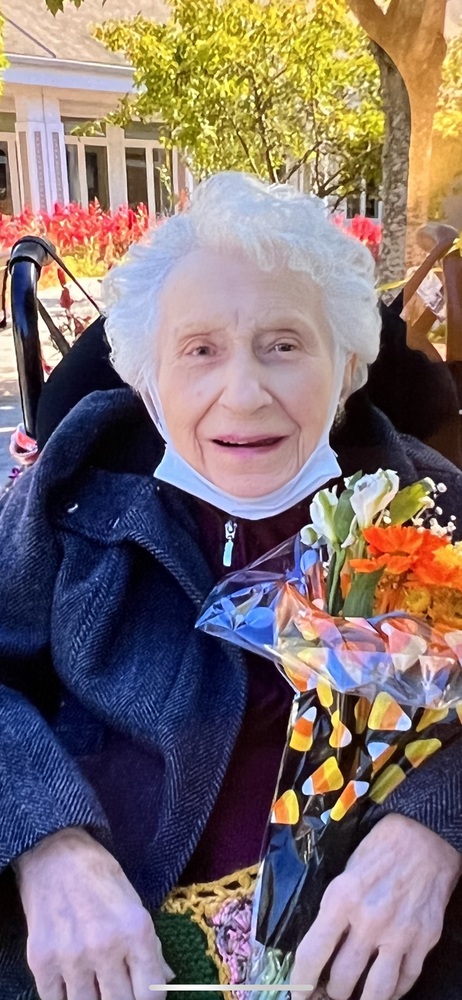
Obituary of Mary S. LaGotta
Mom was the 9 th of 10 children, the youngest daughter born to Francesco and Barbara Catalano in 1922. She was christened “Maria Santa” after her maternal red-haired grandmother she would never meet in Italy.
On the day of her birth, the doctor who attended my grandmother proposed that since she had so many children, she might consider letting him and his wife adopt her newborn daughter. But Barbara said, “No, thank you.” How different a life mom might have had.
Aunt Josie, my mother’s older sister, said mom was spoiled as a child. “She did whatever she wanted and never got spanked.” Well, that might explain a few things . . . [Smile.] Mom attended Ossining High School and made it through 10th grade as an A student. But when she turned 16, her mother took her out of school so she could go to work. Mom was still heartbroken as she told the story years later. She stayed in touch with friends and always kept the Class of 1940 close to her heart.
Mom got a job as a live-in housekeeper and nanny for a wealthy family in White Plains. To her dismay, her duties included feeding the family cat. Mom was extremely fearful of cats, so when it came time for her to saute a piece of fresh salmon for its dinner, she shooed the cat down the cellar stairs and ate the fish herself. No cat was worth a piece of fresh salmon.
In 1950 while working as a waitress at Fiuti’s Italian Restaurant in Montrose, she met Gennarino LaGotta, an incredibly handsome young man with a smile and personality that filled the room. He offered to buy her a beer. Mom retreated to the kitchen. Mrs. Fiuti vouched for him, and mom finally said “Yes.” The rest became history. They shared a dream of a little house where they would raise a family. In a cottage at 670 Main Street with two little girls, their dream came true.
The traditions, hospitality, and abundance our parents embodied were impressed upon us from our earliest childhood. I guess we can’t think of our mother without remembering food. Food was love–unconditional and unlimited. And she was happiest preparing it. She was an incredible baker–rolling lemon twists with the precision my sister laments, she has never been able to match. With the same ease and exactness, she turned out hundreds of stuffed pastries and bowtie cookies that to this day define Christmas. For Easter she kneaded a mountain of sweet dough that rose above the rim of a gigantic ceramic bowl, making dozens of figure-eights and wreaths we ate for days until they were gone. Whoever came to the house left with a plate of cookies or a loaf of the bread. We always seemed to have more than enough. She and Dad were a team when it came to making people feel welcome.
Food WAS love. One Saturday morning after the weekly trip to Julio’s Meat Market for prosciutto and Italian bread, our father suddenly dropped to the floor, his back seized in excruciating pain. It took the better part of an hour for him to crawl to his bed. We lifted his bent legs and propped pillows for his head. Mom hovered over him and almost yelled as if he couldn’t hear her, “Jerry, Jerry, are you alright!?” “Yeah, Mary,” he answered breathlessly. “Jerry, Jerry!,” she hollered, . . . “Do you want a sandwich?” To which he answered, “Yeah, okay.” It was scenes like this that prompted my father on some days to shake his head and mutter from the sidelines, “Ehhhh, you shouldda gone to Hollywood, Mary.”
Mom loved the blue morning glories Dad planted every year. She was the one who brought the salt shaker out to the garden where on Saturday mornings, Dad would pick the ripest tomatoes and we would eat them out of hand, still warm from the sun, sprinkled with the salt. In the sauce made light and fresh with the same tomatoes and a handful of basil, she poached perfect eggs we ate for lunch. It was heaven!
Mom walked everywhere; we never had a car. She never had a checking account or a credit card, but bills were paid in cash, on time, and in-person when possible. There was nothing extra, but we never felt poor. She sewed dresses, slipcovers, and curtains and ran the house with seamless efficiency. Sunday dinners, holiday rituals, seasonal chores clicked by without a glitch. We, her daughters, didn’t necessarily inherit this trait, but that part of our childhood was at least predictable and the routine comforting.
Mom had a playful side–releasing the contents of a can of whipped cream over my father’s nose from time to time; burning a perfect hole with her cigarette through the newspaper he was reading, or breaking into a full-out tap dance she knew would delight us. Where had she learned it? We never fully knew.
She loved her grandchildren–Max, Sadie, and Grace. She pinched their cheeks, indulged them with treats, and gave them oh-so-many stuffed animals and t-shirts from wherever she and Dad had traveled. She fretted they were denied the joys of ice cream and worried that their souls might be lost, so, like TV’s Archie Bunker, we’re pretty certain she took them to church and blessed them with a splash of holy water on their heads. They WOULD BE saved.
She was thrilled to become a great-grandmother to Camille and Colette. Camille wrote that if she could tell Grandma Mary anything, she would tell her that she will continue to share stories about her and Grandpa, cook recipes she passed down, and “always feed everyone in the room before myself because that’s what a good Italian woman does, whether I have Easter Bread or spray cheese” on Ritz crackers!--an actual memory of visiting Grandma Mary.
Mom’s remarkable strength and feistiness were with her well into her nineties. Max remembers her on Christmas Eve when she stayed up half the night helping him stuff bean bag chairs for the girls. Sadie is grateful for the many stories Grandma shared with her in an interview she conducted for a class.
Our mom lived on her own, fiercely independent until she was 95 years old. Known to many as “the cafeteria lady,” she worked over 20 years for the Peekskill School District. She was the designated cake baker for her neighbors at Wesley Hall, a task she mildly complained about but actually took pride in. She would jump on a bus to exchange a pair of stockings, (yes, stockings!), or make the challenging trip down county to see her eldest sister, our Aunt Louise, as she struggled through the last days of her 101-year life.
Maybe it was an Italian thing or because she grew up and grew old with sisters almost 20 years older than she, but no matter what her age mom was respectful to those older than she. She would stop to introduce us, ask if they needed help, lean down to hug them. She taught us to do the same.
Like my father she had a warm smile, one she could turn on even in the last days of her life. It’s a cliche to say they broke the mold when my mom and her sisters left this world. But it’s true. We will never know anyone like them again, we will never know anyone like our mother. She was loved and will be missed by her caretakers. She was loved and will be missed by us. We are, in the end, grateful.
To send flowers to the family or plant a tree in memory of Mary LaGotta, please visit Tribute Store


